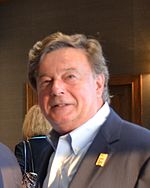Henri Termeer, Date of Birth, Place of Birth, Date of Death
TweetHenri Termeer
American businessman
 Date of Birth: 28-Feb-1946
Date of Birth: 28-Feb-1946
 Place of Birth: Tilburg, North Brabant, Netherlands
Place of Birth: Tilburg, North Brabant, Netherlands
Date of Death: 12-May-2017
Profession: biochemist
Zodiac Sign: Pisces 
About Henri Termeer
- Henri A.
- Termeer (28 February 1946 – 12 May 2017) was a Dutch biotechnology executive and entrepreneur who is considered a pioneer in corporate strategy in the biotechnology industry for his tenure as CEO at Genzyme.
- Termeer created a business model adopted by many others in the biotech industry by garnering steep prices— mainly from insurers and government payers— for therapies for rare genetic disorders known as orphan diseases that mainly affect children.
- Genzyme uses biological processes to manufacture drugs that are not easily copied by generic-drug makers.
- The drugs are also protected by orphan drug acts in various countries which provides extensive protection from competition and ensures coverage by publicly funded insurers.
- As CEO of Genzyme from 1981 to 2011, he developed corporate strategies for growth including optimizing institutional embeddedness nurturing vast networks of influential groups and clusters: doctors, private equity, patient-groups, insurance, healthcare umbrella organizations, state and local government, alumni.
- Termeer is "connected to 311 board members in 17 different organizations across 20 different industries" He has the legacy of being the "longest-serving CEO in the biotechnology industry.He is an "advocate for the Massachusetts biotech industry." "To generate revenues to fund the research, Termeer entered into a number of side ventures including a chemical supplies business, a genetic counseling."Termeer was named as one of the top fifty leaders of thought in orphan drugs and rare diseases in a list published by Terrapin for the World Orphan Drug Congress which included "eminent personalities that have advanced rare disease research." Henri was a biotech pioneer long before anyone knew what biotechs were.
- He founded Genzyme which is often said to have kick started today's orphan drug biotech M&A frenzy.
- Henri is definitely a mover/shaker in the biotech world and in the orphan drug space.
- He will always be known as the guy who figured out how to build a great business by making drugs for rare diseases.
- An inspiration and pioneer, many of his protégés have since moved on to lead other successful companies in the rare disease and biotech space thanks to his influence."
Read more at Wikipedia

